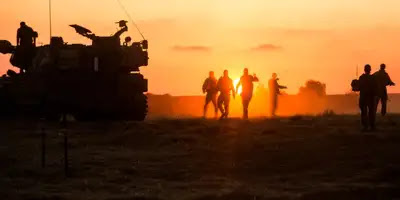Israel-Palestine War: Indian Students In Israel Anxious Amidst Escalating Violence; What Govt Is Doing To Rescue Them
Tel Aviv: There are approximately 18,000 Indian nationals in Israel. Among them around 900 are students who are pursuing various courses in institutes and universities. Most of these students are enrolled in graduate, PG, doctoral, and post-doctoral programs.
Many of these students were caught off guard by the recent Hamas attack, especially since it occurred during a holiday in Israel. To seek safety, they took refuge in designated areas and spent several hours in bunkers until the sirens stopped.
Some Indian students documented their experiences on social media, sharing that they had to remain in shelters for extended periods while Hamas militants roamed the streets. These students maintained constant communication with the Indian Embassy in Tel Aviv through WhatsApp.
Govt initiates efforts to repatriate students stranded in Israel
The Indian government has actively initiated efforts to repatriate the Indian students stranded in Israel. Meenakashi Lekhi, the Minister of State for External Affairs and Culture, emphasized that Prime Minister Narendra Modi and his office are directly overseeing the situation in Israel and planning appropriate actions to bring the students back to India.
Lekhi stated during a press briefing in New Delhi, "The Indian government is making significant efforts to ensure the safe return of these stranded students from Israel."
She also highlighted the government's successful past evacuation missions, such as 'Operation Ganga' during the 2022 Russian invasion of Ukraine and 'Vande Bharat' Mission, which brought back Indian nationals from China during the 2020 Coronavirus outbreak.
Students anxious and fearful
Indian students in Israel are feeling anxious and fearful while their parents back in India are worried about the safety of their children.
According to students, the situation in northern Israel remains relatively peaceful irrespective of the ongoing violence. However, the situation in southern Israel continues to be grave and is a matter of concern, particularly for international students.
Rajiv Agrawal, resident of Faridabad in the northern state of Haryana, said his son is studying at University of Haifa in the north. He said he talked to his son who told him that the situation is grimmer in the southern part and he and his colleagues have been advised to avoid traveling to Tel Aviv and some other cities. Rajesh said the Indian embassy in Tel Aviv has provided helpline numbers for emergency contact to the students and have issued advisories urging all Indian citizens to exercise vigilance.
Despite the efforts of the Indian Embassy, Indian students in Israel remain anxious and fearful. They noted that the situation in northern Israel is relatively peaceful, but the situation in southern Israel remains grave and concerning, especially for international students.
Indian students like Sanjay Mehrotra, who is pursuing a doctoral degree at Hebrew University, stated that they are following Embassy guidelines and ensuring their safety. Vikas Sharma, a postdoctoral fellow at Hebrew University's Givat Ram campus, mentioned that Indian students are staying in hostels and residences provided by the university and are in constant contact with each other and the Indian Embassy through WhatsApp.
Shweta Trishna, a student at Ben-Gurion University in Beersheba, shared that the situation is currently stable in Beersheba, but they had to take refuge in bunkers due to rocket attacks on a previous day. If the situation deteriorates and the Indian Embassy advises them to leave, they are prepared to do so.
An Indian student pursuing doctoral course at Tel Aviv University shared, "We are feeling scared. The Indian Embassy is maintaining contact with us."
Embassy sources emphasized their round-the-clock availability to assist all Indian students and have been actively guiding them through this challenging period.
Manish Saxena, a doctoral student at Hebrew University, said the situation is very bad. “The militants have also infiltrated through land, parachute and small boats, and everything here is closed and we have to stay inside. Militants are driving around and firing shots nearby. We are following the Embassy's instructions diligently,” Manish said.
Manish acknowledged the tense atmosphere in Israel due to the attack but assured that all Indian students were safe. Most of these students were accommodated in dormitories and housing provided by their respective institutions, and they remained in touch with each other and the Indian Embassy.
Students from Nepal caught in crossfire
While Indian students are luckily safe in Israel, the students of neighbouring Nepal were not so lucky. Nepali students were caught in the crossfire, with 10 students from Nepal killed and others injured during the attacks by Hamas on Israel.
The final semester students from Nepal’s Sudurpaschim University were doing field work in Sedot Negev Agriculture Training Center in Israel, just 17 km from the Gaza strip, as a part of their university programme, when they came under attack. Others at the centre included students from Cambodia.
“Ten students have lost their lives in the attack while one is still missing. Four of the injured are receiving treatment,” said Kanta Rizal, Nepal’s ambassador in Tel Aviv.
A friend of the deceased, Louish Rijal, a student at the training centre, said four of his friends were killed in the grenade attack and six others were shot by the Hamas militants. “I was in regular touch with them. First they were attacked with grenades and then some militants entered their bunker and shot them,” Rijal told media. “Most of them died of excessive bleeding. If there was timely treatment they could have been saved.”
The universities in Israel have postponed the start of the academic year due to the ongoing conflict, and many students and faculty members have been called for reserve service.
The Hebrew University of Jerusalem has decided to close certain buildings in areas with uncertain safety conditions, such as Rehovot. Special programs and examinations are continuing as scheduled despite the challenging circumstances.

Comments
Post a Comment